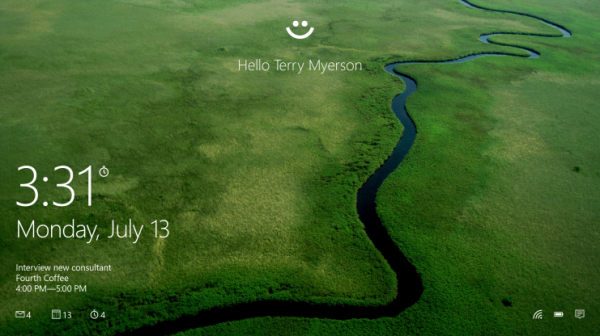Windows Hello and Microsoft Passport to revolutionize security and the Internet
https://youtu.be/1AsoSnOmhvU
Typing a password is prehistoric. Sadly, many of us enter multiple passwords every day. Not only is it tedious, but potentially dangerous. Remembering a unique password for every site and computer is almost an impossibility. This leads to people reusing the same password at multiple sites, which is a poor security practice.
I got wise recently and started using Lastpass to generate and secure my various credentials. Fingerprint scanners such as those found on some of the newer iOS and Samsung Galaxy devices enable biometrics to unlock your device, but also interface with password managers like the aforementioned Lastpass, or 1password. Sadly, similar solutions for Windows computers have been bolted-on and are clunky to say the least. Today, Microsoft announces that it is putting a real focus on biometrics with Windows Hello and Passport.
"Windows Hello introduces system support for biometric authentication -- using your face, iris, or fingerprint to unlock your devices -- with technology that is much safer than traditional passwords. You -- uniquely you -- plus your device are the keys to your Windows experience, apps, data and even websites and services -- not a random assortment of letters and numbers that are easily forgotten, hacked, or written down and pinned to a bulletin board. Modern sensors recognize your unique personal characteristics to sign-you-in on a supporting Windows 10 device", says Microsoft.
The manufacturer further explains, "there will be plenty of exciting new Windows 10 devices to choose from which will support Windows Hello. And, if your device already has a fingerprint reader, you'll be able to use Windows Hello to unlock that device. For facial or iris detection, Windows Hello uses a combination of special hardware and software to accurately verify it is you -- not a picture of you or someone trying to impersonate you. The cameras use infrared technology to identify your face or iris and can recognize you in a variety of lighting conditions".

This is a huge convenience for end users, which can potentially make individual machines and networks more secure. While it is frowned upon, many employees are guilty of writing down their login credentials on notepads, or worse -- a post-it note on the monitor. A finger swipe or glare into a webcam may solve this dilemma.
The real magic will be integration with Microsoft Passport. The company explains, "Passport is a code name for a programming system that IT managers, software developers and website authors can use to provide a more secure way of letting you sign-in to their sites or apps. Instead of using a shared or shareable secret like a password, Windows 10 helps to securely authenticate to applications, websites and networks on your behalf -- without sending up a password. Thus, there is no shared password stored on their servers for a hacker to potentially compromise".
Think about this for a moment. A website or app can take advantage of this technology to verify your identity. Instead of giving a password to the website, Windows verifies your identity with biometrics, tells Passport you are the verified user, and then Passport grants you access to the website. There is no need to remember a password at all -- a password doesn't even need to exist!
Even if a hacker steals your machine or device, they cannot unlock it without you being present. Microsoft promises that hackers won't be able to use things like photographs to trick the machine either.
While most existing fingerprint scanners will work, most webcams will not. Microsoft specifically lists Windows Hello compatibility with only one such camera, the Intel RealSense 3D Camera (F200), for facial recognition.
For now, this is only planned for Windows 10, but I am hoping the self-proclaimed devices and services company will bring the solution to other platforms such as iOS, Android and OS X. Hell, maybe they can even show Linux some love.
Are you excited about this new solution? Tell me in the comments.
